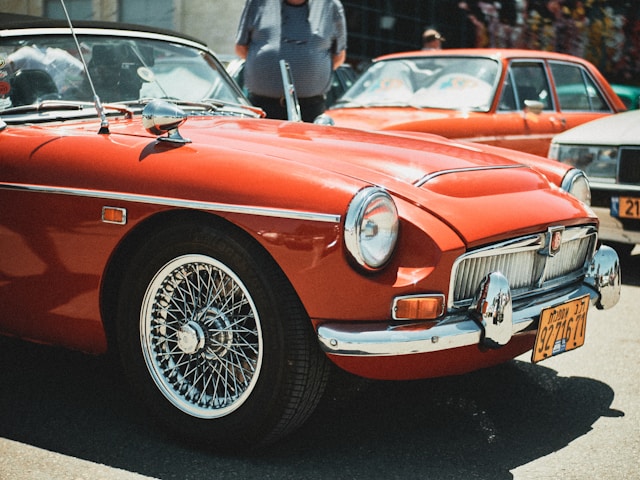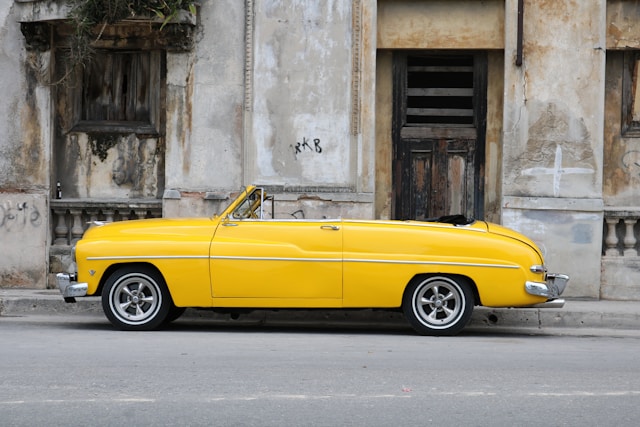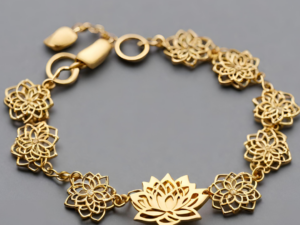We love all things vintage on this site, including vintage cars! Growing up, my father was a big vintage car enthusiast, and I remember when he’d take us out riding in his old burgundy MGB.
Investing in history through vintage cars ownership is a creative and potentially profitable investment plan. For a start, it’s always exciting to own a piece of history. However, vintage cars are not just about the fun; they also involve ample financial benefits. In addition to satisfying one’s nostalgia, they also appreciate in value. They are also a tangible form of investment diversification. Need a little introduction on owning a vintage car? Our guest writers help us dig in:
One of the ways to venture into the vintage investment path is through online platforms such as SCA Auction. Such platforms grant potential vintage owners the perfect opportunity to acquire classic cars of varying industry subsectors affordably. Despite the high chances of being a novice, or even for experienced owners, platforms such as SCA are essential. They grant consumers access to assets that they would have otherwise not access via traditional purchasing ways.

Understanding Vintage Cars Value
The value in vintage cars investment is more than the aesthetic appeal. The roots extend deeper into the cars’ scarcity, history, and emotional worthwhile. While new cars drop in value immediately post-leaving the showroom, classic cars appreciate due to their limited numbers. With the old models becoming hard to maintain since no new ones are being made, the few available become more valuable with time.
Marketable Trends
The classic market shows economy worthiness, with the market performing more than traditional stocks and bonds markets over the years. According to the Knight Frank Luxury Investment Index, over the past ten years, classic cars have an appreciation of about 193%. These statistics indicate the robustness of the vintage car market, making it a trade second to none. The robust nature results from the increased market awareness rising from vintage owners and investing.
Key influencing factors:
Factors that are essential to determining the value of a car are:
Provenance and Originality. Cars with an interesting history or a well-documented one and preferably one that has been owned by a celebrity, charitably sell for a higher price. Vehicles that still have all their parts and maintain their factory specifications are more desired by purists, and thus worth more.
Condition and Authenticity. The state of preservation of a car is a crucial factor in determining its value. Pristine condition examples with authentic parts and minimal or no modification will appreciate more.
Rarity and Desirability. The fewer were produced models and the amount that exist contributes to the worth of the vehicle. Special editions and ones that were far ahead of their time are desired.
How to invest wisely
When you know the basic principles you can hedge the risk of losing money by following these strategies:
- Research. Look up the latest sales trends for the specific model you are considering, new prices achieved at the auction, ask experts, and join car forums.
- Inspection. Have a car you are interested in checked by an expert mechanic, preferably one that specializes in older cars to avoid costly mistakes.
- Insurance. Make sure to get proper insurance that will protect your investment. Specialized insurance for classic cars can provide ‘’agreed value’’ in the case where the vehicle is lost or damaged.
- Storage. Climate-controlled storage will prevent rust and paint deterioration, so invest in a proper facility.
The Joy of Ownership
Finally, even beyond the financial aspects, owning a vintage car is something special. Driving a classic sports car through winding countryside roads or displaying your car at exhibitions or competitions can be a very enjoyable and rewarding experience. Another aspect worth mentioning is that vintage cars enable you to join a closely-knit community of owners who share your interest and ambitions.
Risks and Considerations
At the same time, buying vintage cars includes certain risks. One of the biggest is market volatility, while the high maintenance costs should also be considered. Finally, the risk of depreciation is closely associated with market saturation or changes in collector insanity trends. At the same time, the liquidity of vintage cars is much lower compared to traditional instruments, which means that it may take a lot of time to have your asset converted into cash.
Investing in vintage cars may be a profitable business. For example, it will provide you with an opportunity to get a reasonable income based on the car’s appreciation as well as a vast array of benefits. However, it is necessary to remember that you will only succeed with some experience, enthusiasm, and some strategy. Even though investing in old automobiles lies on the border between pleasure and complete rationality, the success may be particularly thrilling.






